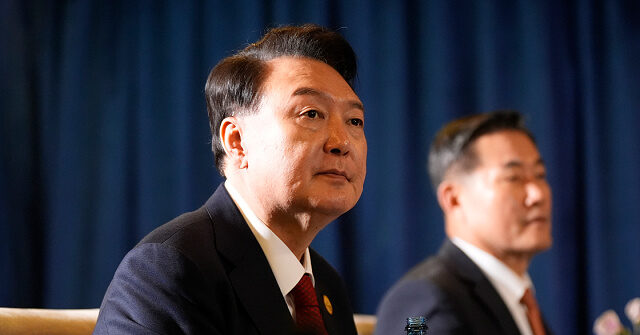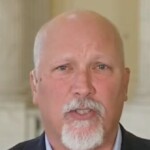The South Korean Justice Ministry banned President Yoon Suk-yeol from leaving the country on Monday, a result of a criminal investigation against him on charges of treason in response to his alarming and bizarre decision to declare martial law last week.
Yoon took to the airwaves on Tuesday night local time and announced that he had imposed military rule on the country, claiming it was necessary to combat unspecified “unscrupulous pro-Pyongyang anti-state forces.” Yoon appeared to blame his decision on the majority leftist-led National Assembly blocking his policy priorities, accusing them of making it impossible for him to govern and those aiding “North Korean communist forces.”
What followed was a dramatic six hours in which National Assembly members hurried over to the legislative chambers to vote against martial law, which the South Korean constitution allows. The lawmakers climbed over gates and walls and fought their way through heavily armed soldiers deployed to prevent them from convening, as any political activity is illegal under martial law. The soldiers did not appear to use their full force to prevent them from voting, however, and subsequent investigations suggest that some soldiers did not fully comply with presidential orders during martial law out of concern about the irregularity of the situation.
The National Assembly voted unanimously against martial law and, shortly thereafter, Yoon announced that he rescinded the order. The opposition Democratic Party immediately moved to impeach Yoon on the grounds that he had violated his constitutional duties and the police opened a treason investigation against him.
That criminal case resulted in Yoon’s ban from leaving the country on Monday. While the criminal case against a sitting president is extraordinary, officials suggested that such a travel ban was perfunctory for that level of crime with a suspect that poses a flight risk. Treason is one of the few crimes in South Korean law for which a president does not enjoy immunity.
The Korea JoongAng Daily noted that a president has never in the history of the country faced a travel ban, inhibiting his ability to conduct diplomacy. It added that law enforcement officials were also contemplating banning first lady Kim Keon-hee from leaving the country and that an emergency arrest of Yoon could occur if police deem it necessary.
Another 11 individuals in Yoon’s administration are under criminal investigation over the martial law declaration, JoongAng reported.
“Emergency travel bans have been imposed on key figures, including former Defense Minister Kim Yong-hyun, former Interior Minister Lee Sang-min,” the newspaper listed, “former Counterintelligence Command Commander Lt. Gen. Yeo In-hyung and Army Chief of Staff Gen. Park An-su, who was named martial law commander during the six-hour declaration.”
Despite not being able to leave the country — and military leaders openly stating they would ignore a second martial law declaration if it came, disregarding orders from the head of state — the South Korean Defense Minister confirmed that Yoon is still in charge of the military on Monday.
“Legally, (the control of military forces) currently lies with the commander in chief,” the defense ministry’s spokesperson Jeon Ha-kyou said on Monday.
The head of Yoon’s People Power Party (PPP) — Han Dong-hoon, who vocally opposed the martial law order and has repeatedly called for his impeachment — on Sunday confused citizens by stating that he believed that Yoon handing over state affairs to Prime Minister Han Duck-soo would include not controlling the military. While Han has repeatedly called for Yoon to step down, significant divisions exist within the PPP and the party blocked Yoon’s impeachment on Saturday. The faction that opposes impeachment is calling for Han Duck-soo to essentially function as president until the end of Yoon’s term.
Opposition lawmakers scheduled a vote to impeach Yoon for Sunday, but the vast majority of PPP lawmakers failed to show up, causing a lack of quorum that forced the National Assembly to scrap the vote.
Han Dong-hoon repeated his call for Yoon to resign after the failed impeachment.
Yoon himself has remained mostly silent since the martial law declaration but resurfaced for brief remarks to the nation on Saturday.
“This declaration of martial law was born out of desperation as the president, the ultimate head of state. But it has caused anxiety and discomfort to the people in the process,” Yoon said. “I am deeply sorry for this, and I sincerely apologize to the people who must have been greatly surprised.”
Yoon promised “there will never be a second martial law” and said that he would trust the PPP to figure out his fate, “including my term in office.”
Leftist South Korean groups have organized nearly daily protests in Seoul calling for Yoon to resign since Tuesday when they rapidly organized a protest against the martial law decree.
KBS World reported on Monday that conservatives have also organized rallies supporting Yoon, though those have not as traveled the world via social media to the same degree as those against Yoon have.


